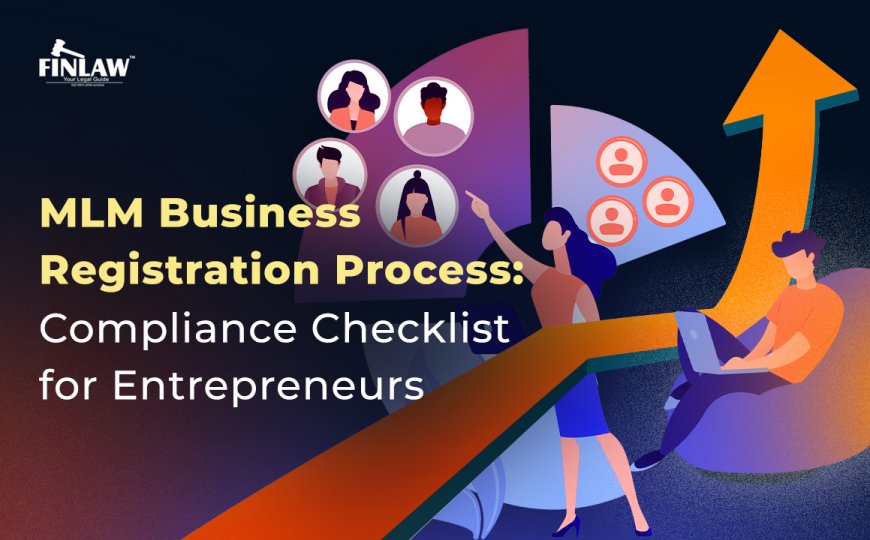MLM Business Registration Process: Compliance Checklist for Entrepreneurs in India
Learn the complete MLM business registration process in India. Step-by-step compliance checklist for entrepreneurs to launch legally.

Starting a multi-level marketing (MLM) business in India can be exciting. The model is attractive because it allows entrepreneurs to build networks, promote products, and grow revenues without heavy upfront investments. But before jumping in, it’s critical to understand the and the compliance obligations that come with it.
This article serves as a comprehensive guide for entrepreneurs who want to start an MLM business in India, covering the legal requirements, step-by-step registration process, and a practical compliance checklist to ensure smooth operations.
Is MLM Legal in India?
The first question most entrepreneurs ask is whether MLM is legal in India. The answer is yes — MLM or direct selling is legal, provided it is product-driven and not structured as a pyramid or money-circulation scheme.
The Government of India has introduced clear rules through the Consumer Protection (Direct Selling) Rules, 2021. These rules lay down strict guidelines to protect consumers and distributors. Any scheme that rewards people only for recruiting others, without genuine product sales, is considered a pyramid scheme and is banned under the Prize Chits and Money Circulation Schemes (Banning) Act, 1978.
In short: If your business is built on real product sales and has transparent policies, you’re on the right side of the law.
Choosing the Right Business Structure
The first step in MLM business registration is deciding on the legal entity. Most MLM businesses in India are set up as:
-
Private Limited Company – Popular for credibility and ease of raising funds.
-
Limited Liability Partnership (LLP) – Flexible and less compliance-heavy than a company.
-
Partnership Firm or Proprietorship – Suitable for very small setups, though not recommended for scalable MLM operations.
A Private Limited Company is generally the most preferred choice because it adds trust and legal recognition, which is critical in the direct-selling industry.
Step-by-Step MLM Business Registration Process in India
Here’s a breakdown of the essential steps every entrepreneur must follow to register and legally operate an MLM business:
1. Company Incorporation
Register your business through the Ministry of Corporate Affairs (MCA). You’ll need digital signatures, Director Identification Numbers (DINs), and incorporation documents such as the Memorandum of Association (MOA) and Articles of Association (AOA).
2. Apply for PAN and TAN
Once incorporated, your company must obtain a Permanent Account Number (PAN) and a Tax Deduction and Collection Account Number (TAN) from the Income Tax Department for tax purposes.
3. GST Registration
If your annual turnover exceeds the prescribed threshold or if you deal in taxable goods/services, GST registration becomes mandatory. It allows you to collect and remit taxes and issue valid GST invoices.
4. Compliance with Direct Selling Rules, 2021
This is a crucial step. Your MLM business must:
-
Publish a transparent compensation plan.
-
Provide a refund and return policy with a cooling-off period.
-
Ensure commissions are linked to actual product sales, not recruitment.
-
Disclose company details, product information, and grievance redressal mechanisms on your website.
5. Open a Current Bank Account
Open a current account in your company’s name to handle transactions and distributor payouts.
6. Product-Specific Approvals
If you are selling consumables, cosmetics, health supplements, or similar products, you may need approvals such as FSSAI licence, AYUSH certification, or clearance from the Central Drugs Standard Control Organization (CDSCO).
7. Intellectual Property Protection
Trademark your brand name, logo, and product names. This step prevents others from copying your brand and strengthens your business identity.
8. Draft Distributor Agreements
Every distributor should sign a clear agreement that sets out their rights, responsibilities, and code of conduct. This protects both the company and the distributor.
9. Tax and Accounting Compliance
Maintain proper books of accounts, file GST and income tax returns regularly, and deduct TDS where applicable. Engage a professional accountant to stay compliant.
10. Data Protection & KYC
Collect necessary KYC documents from distributors (such as PAN, Aadhaar, and bank details) and ensure you handle personal data responsibly.
Key Documents Required for MLM Business Registration
To successfully complete the registration process, keep the following documents ready:
-
Certificate of Incorporation (for companies/LLPs).
-
PAN and TAN of the business entity.
-
GST registration certificate.
-
Proof of registered office address.
-
List of products with descriptions and approvals (FSSAI, AYUSH, etc. where required).
-
Compensation plan and refund policy.
-
Distributor agreements and code of conduct.
-
Bank account proof.
-
Trademark application or registration certificate.
Compliance Checklist for Entrepreneurs
Here’s a simplified checklist you can use to make sure your MLM business stays compliant:
-
Register as a legal entity (Private Limited or LLP).
-
Obtain PAN, TAN, and GST registration.
-
Draft and publish a transparent compensation plan.
-
Implement refund and return policies with a cooling-off period.
-
Ensure commissions are linked to product sales, not recruitment.
-
Secure product-specific approvals (FSSAI, AYUSH, etc.).
-
Open a current bank account for the business.
-
Trademark your brand and protect intellectual property.
-
Sign distributor agreements with every participant.
-
Maintain proper accounts, file taxes, and comply with audits.
-
Appoint a grievance officer and set up a complaint redressal mechanism.
Common Red Flags to Avoid
Many MLM businesses run into trouble because they ignore compliance. Avoid these mistakes:
-
Promising high returns for recruitment instead of sales.
-
Forcing distributors to buy large volumes of stock upfront.
-
Making exaggerated or misleading product claims.
-
Hiding refund or cooling-off policies.
These practices not only damage your credibility but can also invite legal action.
Final Thoughts
The MLM business registration process in India is not complicated, but it does require careful planning and compliance with legal requirements. By registering your entity properly, following the Direct Selling Rules, and creating transparent policies, you can build a sustainable MLM business that earns trust from distributors and customers alike.
If your focus is on real product sales, transparency, and ethical practices, your MLM business has a strong chance of long-term success in India.
What's Your Reaction?



















